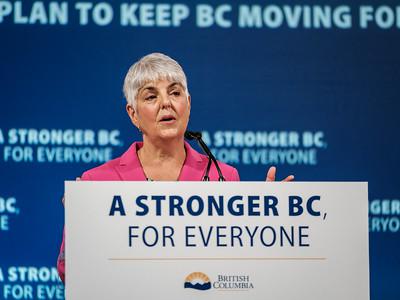Publishing Date
 Finance Minister Carole James delivered the provincial budget in the legislature Tuesday. Minister James announced a surplus in the current fiscal year of $203 million, with projections of modest surpluses between $179 and $374 million over three years. The budget provided updates on cannabis revenue and expenditure projections, increased funding for wildfire and emergency response and an operational reduction for the office of the Auditor General for Local Government.
Finance Minister Carole James delivered the provincial budget in the legislature Tuesday. Minister James announced a surplus in the current fiscal year of $203 million, with projections of modest surpluses between $179 and $374 million over three years. The budget provided updates on cannabis revenue and expenditure projections, increased funding for wildfire and emergency response and an operational reduction for the office of the Auditor General for Local Government.
Budget elements of interest for local government include the following:
- The provincial share of the cannabis excise tax is expected to generate $190 million in over three years. Over the same period, the province estimates $18 million in new costs to support safe implementation of legalized cannabis. This new funding is in addition to a projected $52 million in provincial costs over three years.
- Appropriations for AGLG operations show a reduction from $2.6 million in 2019/20 to $1.8 million in 2020/21 (a reduction of over 30% of the current budget).
- New investments in affordable housing, in addition to the commitment of $1 billion over three years, to support the construction of new low- and middle-income housing as follows:
- $56 million in 2020/21 for 200 new units of supportive modular housing
- $50 million over the three years of the plan for services to support homeless and those at risk of losing their home. Funding will be used to create “navigation centres” to provide integrated shelter, medical and support services.
- Additional funding of $195 million over three years to improve response to wildfires and emergencies in BC. This increases the budget for Fire Management and Emergency Program Act votes to $409 million and $110 million over three years, respectively.
- Provincial property tax revenue to increase by $4.4 % annually over the three years of the financial plan. Property transfer tax slated to increase by $4.5 % annually over the same period.
- The Province will lead a transportation and development study that will build an inclusive multi-modal transportation and development strategy for the Fraser Valley. To be undertaken in partnership with TransLink and BC transit, with extensive engagement with local government and First Nations.
- Home owner grant administrators will work with local governments on the centralization of the administration of the home owner grant.
- Ports Property Tax Act: Beginning in 2020, local governments will have flexibility to create a distinct municipal tax rate for designated port properties when the municipal major industry tax rate is below the upper tax rate threshold.
- In 2019/20 there will be accelerated payments to local governments for infrastructure projects under the Investing in Canada Infrastructure Program and the Capital Regional District Waste Water Treatment program along with the traffic fine revenue sharing program. There will be corresponding reduction in payments through Ministry budgets in 2020/21 and 2021/22.
- Infrastructure spending of $22.9 billion over three years, which includes $7.4 for transportation projects such as the Patullo Bridge replacement, the Broadway Subway and improvement to highway corridors in Delta, Langley and the south coast of Vancouver Island.
- An additional investment of $13 million over three years for developing new opportunities in the bio-economy. This builds upon the prior commitment of $69 million over two years for the Forestry Workers Support program.
- New funding of $419 over three years for Clean BC, for a total commitment of $1.3 billion over four years, including:
- $20 million for financing electric vehicle incentives
- $12 million for charging stations (public and private)
- Total investments in childcare to reach over $2 billion over three years.
- An additional $41 million over three years to enhance public safety and support services, including victim services, correction services, prevention programs and police services.
- $11 million to fund the public inquiry in money laundering.

